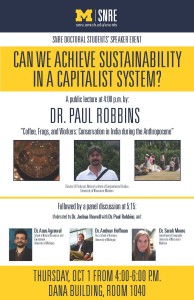UPDATE: For a more in depth review of different conceptualizations of urban resilience and an inclusive definition check out my paper that has now been published in Landscape and Urban Planning “Defining Urban Resilience: A Review”. You can access the full article here.
My name is Sara Meerow and I am a PhD candidate and member of the Urban Sustainability Research Group. I am very interested in the notion of resilience, and since I focus on cities, I’m particularly concerned with urban resilience.The concept of resilience has become increasingly popular and is being applied in a wide variety of policy and academic contexts. It seems that the word “resilience” is cropping up everywhere in publications, research centers, and conferences. There’s the Rockefeller Foundation’s 100 Resilient Cities campaign, the UNISDR’s Making Cities Resilient initiative, and ICLEI’s annual Resilient Cities conference.
It feels like suddenly everyone is focused on becoming more resilient. The idea of resilience has in fact become so popular that some have argued that it represents a new paradigm that may replace sustainability. As James Cascio wrote in his 2009 Foreign Policy article “Resilience: The Next Big Thing”:
Sustainability is a seemingly laudable goal — it tells us we need to live within our means, whether economic, ecological, or political — but it’s insufficient for uncertain times. How can we live within our means when those very means can change, swiftly and unexpectedly, beneath us? We need a new paradigm. As we look ahead, we need to strive for an environment, and a civilization, able to handle unexpected changes without threatening to collapse. Such a world would be more than simply sustainable; it would be regenerative and diverse, relying on the capacity not only to absorb shocks like the popped housing bubble or rising sea levels, but to evolve with them. In a word, it would be resilient.
This quote gets to the core of what differentiates a resilience approach from more traditional sustainability focus. Resilience assumes that change is unavoidable, and instead of aiming to sustain the status quo, tries to improve the underlying ability of individuals, communities, or systems to withstand disturbances and to reorganize and adapt as a result of these changes. The simplest conception of resilience is to picture a rubber band, which can easily bounce back from a disruption.
Urban Resilience
Urban resilience applies this same notion specifically to cities. The rising popularity of urban resilience is fed by growing concerns about urban transformations (whether from rapid growth or shrinking), increasing incidences of natural disasters, and uncertainty about the future (economy, climate change, etc.). Regardless of the reason, there can be no denying that “resilience” has become a buzzword. What is less clear is how resilience can actually be defined, operationalized or assessed, and whether there are tradeoffs and limitations with adopting this approach.
This is a very brief introduction to, and gross oversimplification of, the concept of urban resilience. In my future research I will be exploring this concept in much more detail.

